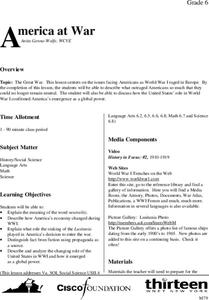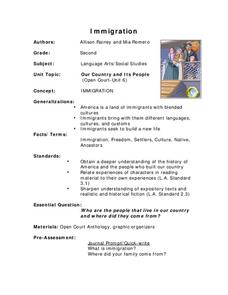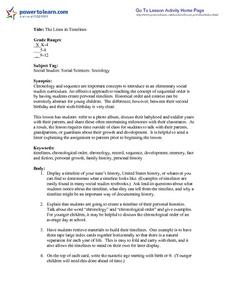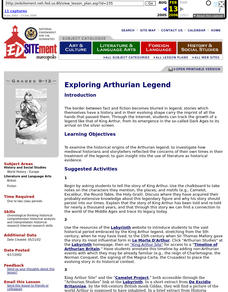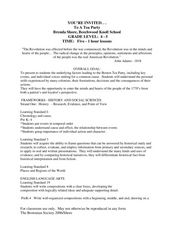Curated OER
Social Studies: Heroes in American Culture
Students examine heroes and discuss their characteristics, values, and actions. They produce Powerpoint presentations on real-life and fictional heroes. Students interview veterans for an oral history project.
Curated OER
The Philadelphia Convention
Eighth graders investigate the conflict over representation that occurred at the Philadelphia Convention. They participate in a class discussion, and in small groups represent a fictional large population state and small population...
Facing History and Ourselves
Confirmation and Other Biases
As the investigation into the reporting of the events in Ferguson, Missouri, continues, class members consider how bias influences perception, how the tendency is to collect evidence that supports preconceived notions. The big idea...
Facing History and Ourselves
Verifying Breaking News
The attempts of journalists to verify the events surrounding the shooting of Michael Brown take center stage as individuals analyze three of the initial newspaper accounts of the story. The whole class discussion then focuses...
Curated OER
Molly Pitcher -- "Out of Many, One"
Students research, brainstorm and analyze the events that lead up to the Revolutionary War. They critique a piece of artwork depicting a scene from the Revolutionary War. Each major battle is plotted on a map to show a visual...
Curated OER
Stir Up a Character Analysis Recipe
What ingredients make up a character? A cup of honesty, a dash of humor, a pinch of cynicism? Based on real cookbooks they review in class, learners at any grade level three and up write recipes to describe characters familiar to your...
Curated OER
Lesson: After Nature: Visions and Visionaries
Build visual literacy, discussion, and critical thinking skills with an innovative art lesson. Young analysts discuss the use of decalcomania, surrealism, and automatism in various contemporary pieces, discuss constructed truth, and...
Curated OER
The Luck of the Irish
Students are introduced to a variety of customs and traditions relating to the culture of Ireland. They view a video, explore the art of storytelling, research sport origins, cook Irish food and discuss well-known Irish proverbs.
Curated OER
Pictures from Korea: Shards of an Almost Forgotten Past
Students explore the Korean War through photography. In this Korean War lesson, students examine photographs taken by a soldier and respond to question about them.
Curated OER
Jack London's The Call of the Wild: "Nature Faker"?
Students examine how Jack London tells a story from the point of view of an animal. They read and discuss primary source documents, analyze text and excerpts, complete a chart, and explore various websites.
Curated OER
Jack London's The Call of the Wild: "Nature Faker"?
Students take a stand on whether or not London could be dubbed a "nature faker." They support their position with evidence either historical or from the text. Students write an essay, complete with hypothesis and textual support, on...
Curated OER
Civil War Play Lesson Plan
Students act out the Civil War through reader's theater. In this performing arts lesson, students research the Civil War and find costumes, props and scenery appropriate to the time period. They become characters from the Civil War time...
Curated OER
America at War
Sixth graders examine issues that faced Americans during World War I, discuss role that sinking of the Lusitania had in America's decision to enter the war, and analyze changing role of U.S. during the war and how it emerged as a world...
Curated OER
All About Almanacs
Use almanacs to entice your learners to explore non-fiction texts in celebration of Read-An-Almanac Month!
Curated OER
"Spelldown" by Becky Mushko
Learners read Spelldown, by Becky Mushko and consider how it portrays the Appalachian community. They define and discuss vocabulary presented in the story and write a comparison/contrast paper analyzing two of the story's characters. The...
Curated OER
Writing American Diaries
Young scholars examine the concept of historical perspective in writing. They read the diary of Sally Wister, a young Patriot from Philadelphia during the Revolutionary Era. Additionally, they must include different points of view in...
Curated OER
Immigration
Second graders read about immigration from their text. They select one culture and identify characteristics of the group. Students complete a graphic organizer (included with the lesson plan). They recall and list various aspects of...
Curated OER
Researching the Past
Learners research the western movement in order to learn note taking strategies with nonfiction texts. They use the Internet to search for important information about the western movement using the Cornell Notes note-taking system. They...
Curated OER
Ku Klux Klan
Students discuss, write, and identify symbols of the activities of the Ku Klux Klan in the 1920's in Indiana. In this Ku Klux Klan lesson plan, students also take a field trip to view the Thomas Hart Benton Murals at Indiana University.
Curated OER
A Closer Look at the Klan
Fourth graders learn vocabulary, answer discussion questions, complete writing assignments, and identify symbols connected to the Ku Klux Klan. In this Ku Klux Klan lesson plan, 4th graders also go on a field trip to the Thomas Hart...
Curated OER
The Lines in Timelines
Students are introduced to the concept of sequence by creating their own personal timeline. As a class, they put the events of the last week of their lives into the correct order and determine what information should be used for their...
Curated OER
Exploring Arthurian Legend
Students use the internet to track the growth of the King Arthur legend from the Dark Ages to its arrival on the silver screen.
Curated OER
Tango Stories
Pupils listen to tango music and research the country it came from. In this music lesson, students find that tango music comes from Argentina. They listen and dance to the music and then write stories.
Curated OER
You're Invited...To A Tea Party
Kids read the book Boston Tea Party by Steven Kroll and use maps to locate various landmarks. They identify the cause and effect of the events related to the Boston Tea Party, then write a descriptive composition.












